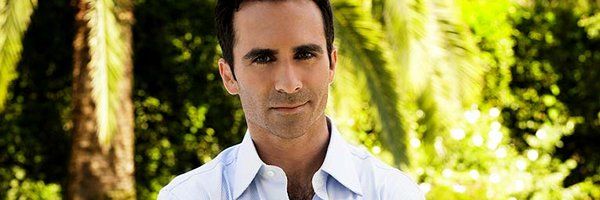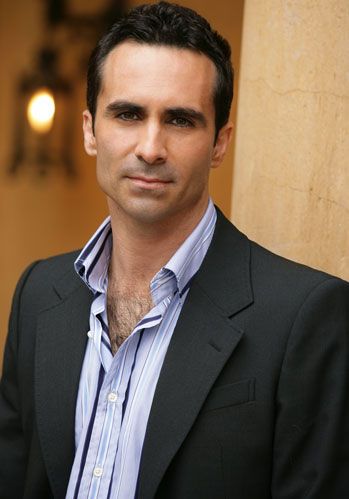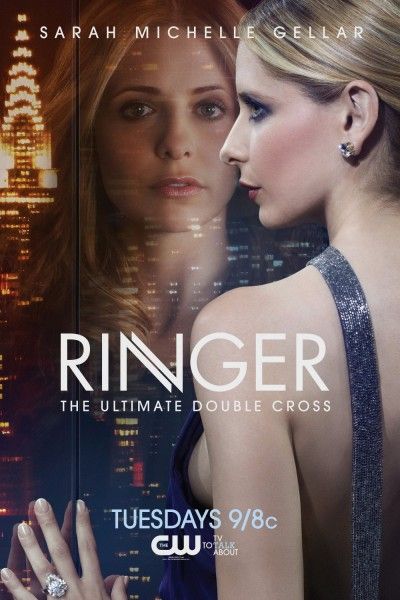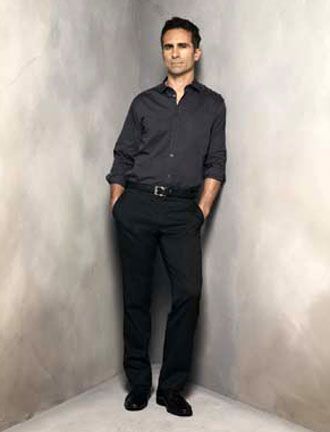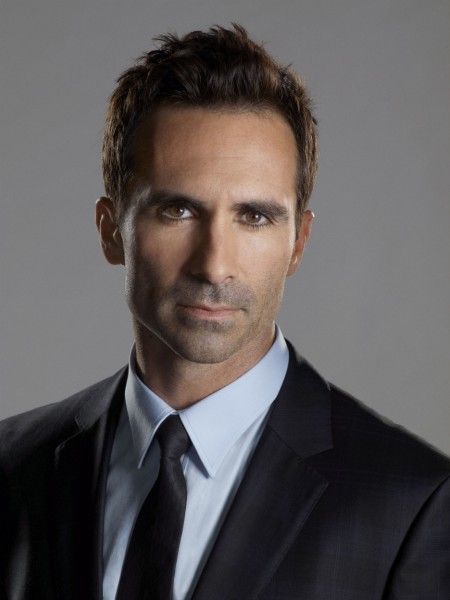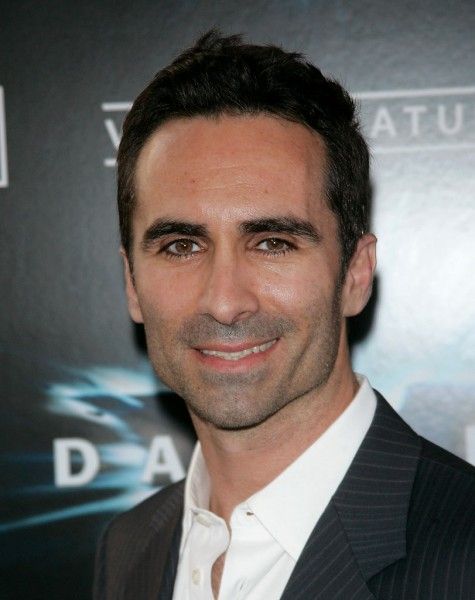On the CW’s new serialized drama Ringer, actor Nestor Carbonell plays FBI Agent Victor Machado, whose key witness, Bridget Kelly (Sarah Michelle Gellar), has disappeared before she was set to testify in a trial that would send a mob boss to prison. Despite the assurances of her protector, Bridget decides to hide out by assuming the life of her wealthy identical twin sister Siobhan Martin (also played by Gellar), only to learn that her sister’s seemingly idyllic life is just as complicated and dangerous as the one she’s trying to leave behind.
During a recent exclusive interview with Collider, Nestor Carbonell talked about how the serialized nature and dark aspects of Ringer really appealed to him, how nice it is to already have viewers interested in and anticipating the series, how much he’s been enjoying working with Sarah Michelle Gellar in both roles, and that viewers will regularly get answers to questions as new ones arise. He also talked about what it’s like to know you’ll always be a part of TV history (as a result of his time on Lost), the experience of playing Mayor Anthony Garcia and working with director Christopher Nolan for The Dark Knight films, and how he wasn’t even given a script for The Dark Knight Rises. Check out what he had to say after the jump:
Question: How did you come to this? Had you been looking for another show?
NESTOR CARBONELL: Yeah, I was looking. Coming off of Lost, I didn’t know what I wanted to do, initially, because it was such an amazing experience. We finished that season last March, and we had a lot of interviews after that, which took me out of pilot season. But, when pilot season came around, I said, “I want to start looking and see what else is out there.” In large part, thanks to a show like Lost, and other shows that broke a lot of ground, a show like Ringer is now in pilot season.
Usually, something like that wouldn’t have even been around, except maybe on the cable front, but it was a CBS pilot. I was really shocked and surprised that they were championing a serialized thriller. They did a smart think in laying it out for The CW because it’s more up their alley, but I was so glad to hear that they would champion something like this. So, that was really encouraging. I read it and thought, “This could be something really interesting.”
I’d played an FBI agent once before and had so much fun doing that. The role has some darkness to it, which I’m enjoying. I like all those elements. And, I met with the writers and they were terrific. I met with Sarah [Michelle Gellar] and loved what I heard, and said, “This could be a lot of fun.”
For people who are curious about the show, what can you say, as far as what it’s about and how your character fits into the story?
CARBONELL: The show is a serialized thriller where, at the heart of it, Sarah Michelle Gellar played Bridget, a witness to a crime. She runs away from testifying to this murder that she witnesses. I’m trying to chase her and follow her all the way to New York, where she assumes the identity of her twin sister, only to discover that her twin sister doesn’t lead the wonderful life that she thought she did, and now she’s in even deeper trouble. Those are the broad strokes of it. It’s a thriller. She’s now stuck in her sister’s life and doesn’t know how to get out of that. She also wonders whether she shouldn’t just fully embrace it and go with it. That’s essentially where we start the show.
How much of this character was on the page when you signed on, and how much has been a collaborative development along the way?
CARBONELL: I think most of it has been on the page. Even if it’s not in the dialogue, a lot of the nuances are in scene directions. I always like to try to bring whatever I can to what is on the page, so I like to find as much dimension as I can, in each role. But, the writing is really strong and they are certainly allowing for humor, on his side, even though he’s a pretty intense guy. I think it’s smart to lighten things up a little bit and show a different side of him. There’s a little bit of playfulness. Even though it wasn’t clear in the pilot, I was like, “There’s no way this guy is going to be a squeaky clean FBI guy. This guy has got skeletons in his closet and some darkness to him. Something is up with this guy. And, if there isn’t, there will be.”
Because this is a show that’s a little bit different from what’s already on television, was it nice to learn that it’s one of the most anticipated shows that people want to see?
CARBONELL: You always want to hear that people are anticipating it, absolutely. Certainly, Sarah Michelle’s return to TV is a big deal. There’s a lot of expectation, to see what she’s doing next. Because of the premise of a serialized thriller, it’s pretty interesting, in and of itself. It has a film noir edge to it. Yeah, I think there’s a lot of anticipation, and there’s also a big risk component to it because it is serialized. You hope that an audience latches on quickly and that they hold on. And if it connects, the reward is even greater because you’re doing something where people have to watch every episode and you get really committed fans, like we had with Lost. The CW has so embraced the show.
As one of the only characters in the pilot that interacts with both twins, what’s it like to work with Sarah Michelle Gellar and see her play both roles?
CARBONELL: It was great to get to work with Sarah Michelle as both Bridget and Siobhan. Without giving anything away, I’m now getting to work more with Bridget as Siobhan. She’s taken on that role by assuming the identity of her twin, which is great because I’m essentially getting two in one. Probably 95% of the stuff I’ve done is with Sarah Michelle. She has chemistry with a chair. She is such an open person. She’s so warm that it’s easy to connect with someone like that. She makes it look effortless, and that’s not an easy quality to have. She’s very accessible, as an actress, and has set a great tone on the show. It’s been great to connect with her, mostly as Siobhan through Bridget.
As an actor, is it fun for you to get to do more intimate scenes with two people interacting, as opposed to the big ensemble you had on Lost?
CARBONELL: I love scenes with two people. Those scenes on the beach on Lost were so much fun. When it was a whole group scene, you’d just pop in with a line here and a line there, and there was a little activity, and you essentially spend the day with your friends on the beach. What an amazing working environment. But, in terms of connecting with a scene, when you get a run at a two-page scene where it’s just two of you, you feel like there’s an arc to the scene and a place to go to. I find that those one-liners are harder than actually doing a two-page scene because you’re like, “Okay, where do I come in? Here’s my line. Don’t make too much of it. Don’t make too little of it.” You have a greater chance of getting in your head when it’s just one line, as opposed to just two of you, in an intimate setting.
Having had the experience you did with serialized television on Lost, how is this show handling the serialized story to keep people coming back?
CARBONELL: It’s tricky to do a serialized show and not lose viewers along the way because you really have to watch every episode. What I think the writers are doing so well, especially in Episode 2 and 3, is that while they introduce so many mysteries in the pilot, the episodes feel somewhat contained. They will solve one mystery in each episode, while they reveal other mysteries. They make a point of addresses certain issues, so that you feel a sense of closure, in some respects.
Will viewers start getting some answers right away then?
CARBONELL: Yeah, you’ll definitely get answers and closure to certain issues. There’s a dead body at the end of the pilot, and Episode 2 focuses very much on that element of the story. That’s a really smart conceit and a really great way to slow everything down. It’s like, “Okay, let’s just deal with this one element and ground it and show what you would do, in that situation.”
Lost grew in popularity over time, but Ringer has had a lot of focus on it, right from its inception. Is that attention more exciting for you, as an actor, or does it give you more pressure to live up to what everyone is expecting from the show?
CARBONELL: It’s always hard when you have expectations of something because it’s hard to live up to anyone’s expectations of anything. All we can do is just do the best job we can. It’s always hard to create a new world. (Show creators) Nicole [Snyder] and Eric [Charmelo] have created a new world, and the actors are trying to flush it out with them. We’re all cogs in the wheel, trying to flush out the story that they’ve concocted, which is a really interesting one. There are expectations with Sarah returning to TV, and just in general. Over the years, TV has gotten so much better, especially with the advent of cable. The bar has been raised. I think HBO really set the standard with The Sopranos, and then on mainstream TV, shows like Lost broke amazing ground. The bar is really high right now in TV, so there are expectations. You just have to hope that people give you a shot and go along for the ride with you, especially on a serialized show like this.
Actors dream about those roles that people will always remember. What’s it like to have had that experience with Lost, and to know that you will forever be a part of TV history?
CARBONELL: It’s amazing. To me, that was a gift. I almost didn’t audition for that part. I was going to go in as a guest star. I got the material the night before, and there was a lot of it. It was to basically be in a flashback with Juliet (Elizabeth Mitchell), to recruit her to the Island. Because I didn’t want to blow the audition, I almost didn’t go in. I said, “You know what? I just haven’t had enough time with the material.” And then, at the last minute, I said, “I’ve gotta go. I like the role so much. What do I have to lose, really?” Thankfully, I was the last one to read for that part, at 3 o’clock that afternoon, and a few hours later, I got the part. I thought, “Great! Fantastic! I’ll get to do this awesome guest spot on an amazing show.” Little did I know that it would grow to be what it was. To be a part of a show like that and to have gotten to do the material that they gave me, especially with the backstory that they gave me, I’ve been around long enough to appreciate that that was a rare and wonderful thing, and I embraced it fully. It was a dream job.
What’s it like to be a part of the Dark Knight films and work with a director like Christopher Nolan?
CARBONELL: It’s been amazing. It’s interesting how I got that part. I was doing Lost at the time and I had auditioned for it, but didn’t hear anything. I was in the jungles with Michael Emerson, doing a scene for Lost, and I got a call from my agent, in between scenes, saying that after having auditioned awhile back, Christopher Nolan wanted to see tape on me. I said, “Oh, wow, for what movie?” I had just assumed that that part was gone, but my agent said, “For that Batman movie.” So, they sent him some scenes I’d done from Smokin’ Aces, which hadn’t been released yet, and I got the call later. Once I got the part, I thought, “Wow, I’ve done mostly independent film and TV. I’ve never done a movie on this scale.” Of course, your first one is very intimidating. Obviously, Christopher Nolan has done some great work. But, the set could not have been more warm, inviting and relaxed. It’s the kind of environment he creates. Everyone jokes around and it’s very loose. It’s a pretty extraordinary working environment, given how intricate, involved and smart his films are. He has a very relaxed atmosphere, and he’s very smart to do that. That’s who he is.
He’s one of the few filmmakers that is able to keep so many aspects of his films a secret, allowing audiences to have that element of surprise.
CARBONELL: Absolutely! The true fan doesn’t really want to know. You want to know, but you don’t. I think it’s great. With Lost, I had never worked on a show before where I had my name on every page. I was like, “Wow, I know it’s a big show. It’s so sweet of them to invite me and put my name on every page.” I didn’t realize that it was so I didn’t spread it on the Internet without them knowing who to come after. But, I loved that. I was part of a show where there was such anticipation, as to how it was going to be resolved. They were obviously telling a good story, if they had to put my name on every page. As Ringer kicks off, I think there will probably be even more secrecy than there is now. Right now, my name is not on every page, but I wouldn’t be surprised if that started happening soon.
How much have they told you about where things will be going when you signed on, and how much are you learning about the story as you go?
CARBONELL: They’ve told me nothing, beyond what I’m reading on the page. But, I got used to that with Lost, and even Dark Knight. I didn’t get a script for Dark Knight Rises, or even Dark Knight. I’m only picking projects now where I’m not allowed to know anything about them. It seems like a pretty good rule of thumb.
Does that make it challenging to develop character backstory for yourself?
CARBONELL: It was initially a hard thing for me, especially with Lost. How do you move forward, if you don’t know where you came from? The challenge is to create your own backstory, which is what I did on Lost. Of course, I was completely wrong, every time, but at least you commit to something and you justify it emotionally. You just hope you’re somewhere in the ballpark, and you tweak it from there. It keeps you honest and keeps you guessing.
What was it that initially drew you to acting?
CARBONELL: There was only one elective at my college for acting, but thank god for that elective because we had a great teacher who introduced me to the Meisner technique for acting. Once I read that book, I said, “Wow, if I could do that and have that honest moment on stage, that would be amazing.” I had that once and it was like a drug. You’re actually connecting with somebody under imaginary circumstances. It’s crazy. You’re pretending to live something, but actually feeling like you are. That’s pretty cool. So, what drew me to it was that proverbial first moment that I felt.
Are you still as passionate about the craft now, as you were when you started?
CARBONELL: I’m still as passionate about the actual craft and that moment. If you lose that, you’re dead in the water. But, I’ve put the business in perspective. I’m married with kids now, so I’m able to see the big picture a lot easier now. It’s an amazing job, but at the end of the day, it’s a job. Between action and cut, that’s my time and my partner’s time, but everything else is put into perspective. It’s a great job and I’m grateful when I have it, but the important thing is obviously at home.
Having done so much film and TV work throughout your career, is there still something you haven’t gotten the chance to do yet, that you’d love to try?
CARBONELL: I haven’t done enough action. On Smokin’ Aces, I got to do a fair bit of action and I love that. It was so much fun. It was cool. It was great working with Joe Carnahan. I’d love to work with him again. He’s got such a great style, and tries so many different things. He’s not afraid to try different genres. I’m always drawn to comedy, too. I did a little turn on Wilfred, which I had a lot of fun with. That’s a very funny show. But, I wouldn’t mind getting back to that, at some point, as well. I miss it. If it’s strictly comedy, I like to bring some darkness to it. If it’s strictly drama, I always like to lighten it up as well. I like to find some kind of dimension and make my characters human, so that it doesn’t feel like a sketch and feels more like a slice of life.

